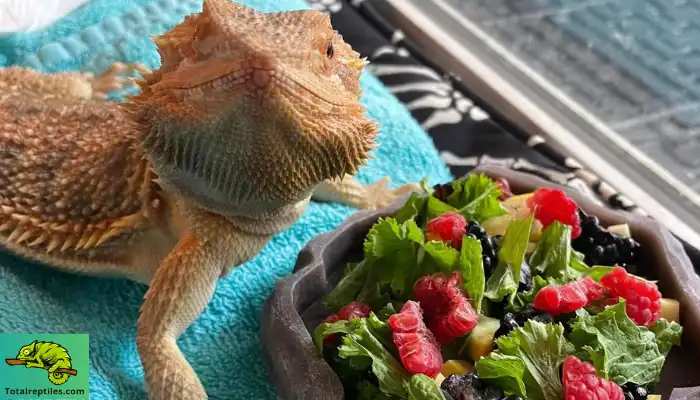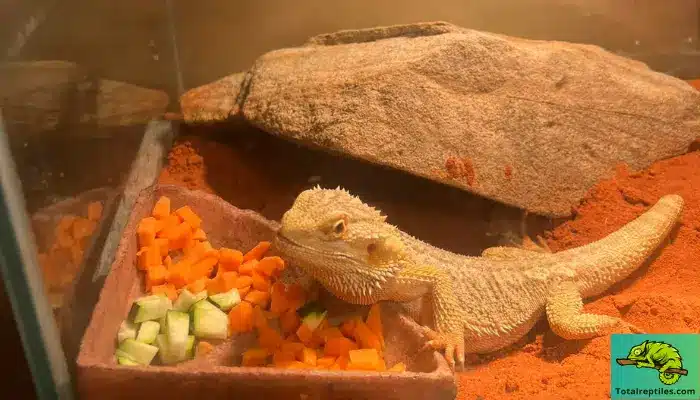Bearded dragons will lick their lips with a variety of fruits. These Reptiles enjoy apples, bananas, strawberries, and apricots.
Also, they can eat mention watermelon, raspberries, peaches, grapes, and figs!
Avoid high-sugar fruits.
Additionally, offering your dragon seasonal fruits is a great way to provide them with fresh and nutritious options.
Want to treat your bearded dragon to some yummy fruits? While veggies should make up the bulk of their diet, fruits can be a fun and healthy supplement in moderation. But not all fruits are created equal when it comes to bearded dragons.
So, let’s go further into the wonderful world of bearded dragon fruit cuisine.

Safe Fruits for Bearded Dragons
| Fruits | Nutrition Value | Benefits |
| Apples | Vitamins A and C, Fiber | Supports the immune system, aids digestion |
| Bananas | Potassium, Vitamin B6, Fiber | Promotes muscle function, provides energy |
| Strawberries | Vitamin C, Fiber, Antioxidants | Enhances skin health |
| Apricots | Vitamins A and C, Fiber | Supports vision health |
| Blackberries | Fiber, Antioxidants | Boosts immune system and aids digestion |
| Blueberries | Fiber, Antioxidants | Promotes brain health, aids digestion |
| Cranberries | Antioxidants, Fiber | Supports urinary tract health |
| Cherries | Antioxidants, Fiber | Reduces inflammation, promotes overall health |
| Watermelon | Vitamins A and C, Hydration | Provides hydration, supports overall health |
| Raspberries | Fiber, Vitamins C and K, Antioxidants | Enhances the immune system, aids digestion |
| Peaches | Vitamins A and C, Fiber | Supports digestion, promotes skin health |
| Grapes | Hydration, Antioxidants, Fiber | Provides hydration, boosts the immune system, and aids digestion. (it’s acidic, too, so give it in small amounts or avoid) |
| Figs | Fiber, Minerals | Supports heart health |
| Guava | Vitamin C, Fiber | Boosts immune system and aids digestion |
| Kiwi | Vitamin C, Fiber | Supports digestion |
| Pears | Vitamins A and C, Fiber | Boosts immune system and aids digestion |
| Honeydew | Vitamins A and C, Hydration | Provides hydration, aids digestion |
| Coconut | Hydration, Healthy Fats | Provides hydration, offers healthy fats |
| Dragonfruit | Fiber, Antioxidants, Hydration | Enhances digestion, provides hydration |
| Papaya | Digestive Enzymes, Vitamin C, Fiber | Supports digestion, boosts immune system |
| Mango | Vitamin A, Antioxidants, Fiber | Enhances vision, boosts the immune system, aids digestion |
Best Fruits for Bearded Dragons
Here are some of the top fruits to feed bearded dragons:

1. Berries
Berries are a beardie favorite! Good options include strawberries, blueberries, raspberries, and blackberries. Make sure any berries you feed are fresh. Cut them into bite-sized pieces before serving. Berries provide great nutrition, antioxidants, vitamin C, fiber, and more.
2. Banana
Bananas offer potassium, magnesium, and vitamin B6. Feed a thin, peeled slice once or twice a week. Too much can cause constipation.
3. Mango
Mangoes are high in vitamins A and C. Chop up a small piece of ripe mango (minus the skin/pit) as an occasional treat.
4. Melons
Watermelon, cantaloupe, honeydew, and other melons provide hydration. Small diced pieces of melon are great on hot days.
5. Apple
Apples offer vitamin C, fiber, and hydration. Cut a thin slice of peeled apple weekly for a sweet, healthy treat.
6. Papaya
Papaya is packed with antioxidants, vitamins, and enzymes. It’s best to feed ripe papaya to dragons.
7. Pears
Pears offer vitamin C, K, copper, and fiber—core and chop pears into small pieces to feed.
8. Apricots
Apricots provide beta carotene for vitamin A and vitamin C. Cut in half and remove the pit before slicing into pieces to feed your beardie.
9. coconut
Coconuts can offer some nutritional benefits to bearded dragons, like vitamins, minerals, and healthy fats.
10. Dragon Fruit
Dragon fruit is known for its unique pink, yellow, or red flesh and black edible seeds. With its sweet, mild taste and fun-to-eat texture, many bearded dragons will readily gobble bites of this fruit.
Overall, berries and melons are great go-to fruits for bearded dragons. Bananas, mangoes, apples, and papayas can also be fed in moderation.
The Benefits of Feeding Fruits to Bearded Dragons
Let’s take a look at the benefits of incorporating fruits into your bearded dragon’s diet :
Vitamins and Antioxidants
Fruits like apples, strawberries, and kiwi are rich in vitamins A and C, which boost the immune system and overall health.
Free radical-fighting antioxidants in blueberries, raspberries, and cherries enhance cellular health.
Hydration and Digestion
High-water fruits like watermelon, honeydew, and papaya keep your bearded dragon hydrated.
Apricots, figs, and pears contain fiber that improves digestion and prevents constipation.
Nutrient Diversity
Your bearded dragon needs various nutrients to grow and thrive, so feed it fruits.
Fruits provide vitamins, minerals, and useful substances for a balanced diet.
.Enrichment and Mental Stimulation
Offering fruits to your bearded dragon provides them with a varied and interesting diet, promoting mental stimulation and reducing boredom.
The different textures and flavors of fruits offer sensory enrichment, enhancing their overall quality of life.
Seasonal and Natural Options
Choosing seasonal fruits ensures your bearded dragon enjoys fresh, ripe, locally available produce.
Seasonal fruits are more likely to be at their nutritional peak, providing optimal benefits for your pet.
Preparing Fruits for Bearded Dragons: Step By Step
Now, we will explore essential steps in preparing fruits for bearded dragons, including washing, removing seeds and skins, and cutting them into appropriate sizes.
Step-1: Washing and Cleaning
Before offering any fruit to your bearded dragon, it’s crucial to thoroughly wash and clean it to remove any dirt, pesticides, or wax.
Use plain water or a fruit and vegetable wash designed for reptile consumption.
Gently scrub the fruit’s surface, especially if it has a thick skin or rough texture.
Step-2: Peeling and Removing Seeds
For fruits like apples, pears, and peaches, it’s advisable to peel the skin to reduce pesticide residue or digestive issues.
Remove any seeds or pits from fruits, as they can be a choking hazard or contain toxic substances to bearded dragons.
Step-3: Cut Fruits Into Appropriate-Sized Pieces
Cut fruits into appropriate-sized pieces to make them easier for your dragon to consume and reduce the risk of choking.
Step-4: Mashing or Blending
Bananas and papaya can be mashed or mixed to make them easier for your bearded dragon to consume.
Fork-mash or mix the fruit to a creamy purée.
If using a blender, ensure there are no large chunks or fibrous parts that may be difficult for your dragon to swallow.
Step-5: Serving Fresh or Frozen
Fresh fruits are ideal for providing maximum nutritional value. Frozen fruits can be served as a treat, especially in hot weather, because they cool.
Thaw frozen fruits before offering them to your bearded dragon, ensuring they are at room temperature or slightly warm.
What fruits can bearded dragons not eat?
While bearded dragons can enjoy a variety of fruits, there are certain ones they should avoid, especially those that are citrus or highly acidic.

Here’s a list of fruits that bearded dragons should not eat:
Oranges: Oranges’ strong acidity might irritate the digestive tract and create watery stools.
Lemons: Due to their acidity, lemons might upset a bearded dragon’s digestive system.
Limes: Limes, like lemons, are acidic and can upset the stomach.
Pineapple: Pineapple enzymes may cause digestive issues in bearded dragons.
Tangerines: Tangerines and other citrus fruits can be highly acidic and may cause digestive upset in bearded dragons.
Grapefruits: Grapefruits benefit bearded dragons but can also cause high acidity levels, which can be overwhelming for a bearded dragon’s digestive system, resulting in digestive disturbances.
conclusion
Fruits can be a tasty part of a balanced bearded dragon diet when fed properly. Good fruit options for beardies include certain berries, melons, papaya, banana, mango, and apple. Always serve fruits in moderation – 1-2 times per week.
Chop into bite-sized pieces and avoid any with pits, seeds, or rinds. Monitor your beardie for signs of GI upset when introducing new fruits. Limit high-sugar fruits to help prevent diarrhea. With caution, fruits can give your bearded dragon variety and great nutrition!

